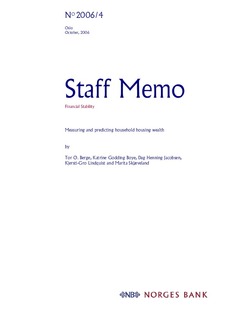Measuring and Predicting Household Housing Wealth
Berge, Tor Oddvar; Boye, Katrine Godding; Jacobsen, Dag Henning; Lindquist, Kjersti-Gro; Skjæveland, Marita
Working paper
Permanent lenke
http://hdl.handle.net/11250/2508019Utgivelsesdato
2006Metadata
Vis full innførselSamlinger
- Staff Memo [282]
Sammendrag
At Norges Bank, a small model has been developed, which includes estimated equations for the two variables that ultimately determine developments in household housing wealth, namely house prices and housing investment. In addition, the model includes definitional equations for housing stock and household housing wealth. We use the model to analyse the driving forces behind observed developments in house prices and housing stock. Furthermore, even though our model is a representation of a limited part of the economy, by simulating the model, we can gain insight on the relationship between house prices, investments and housing wealth when shocks hit the economy. Interest rates affect the housing market through several channels, and by simulating the model assuming a shock to interest rates, we can learn more about the direct and indirect effects. Simulations on our small, simultaneous model show that an increase in interest rates affects housing wealth through a negative direct effect on both house prices and investments. The fall in house prices reduces housing investment further. This curbs growth in housing stock and dampens the negative effect of the interest rate shock on house prices. The direct effect on house prices of the increase in interest rates clearly dominates, however. Our model also includes an estimated equation for household debt. A higher interest rate, coupled with a fall in house prices, reduces household debt growth for a long time. The rest of this paper is organised as follows: Section 2 outlines alternative measures of household housing wealth; in Section 3 we present a small simultaneous model and the simulations, while Section 4 provides a conclusion.

